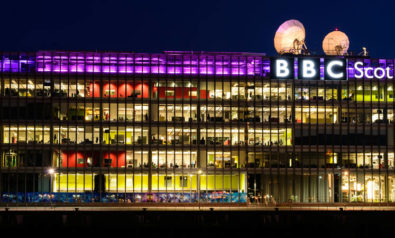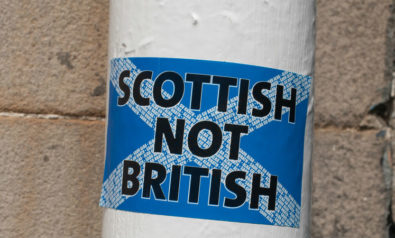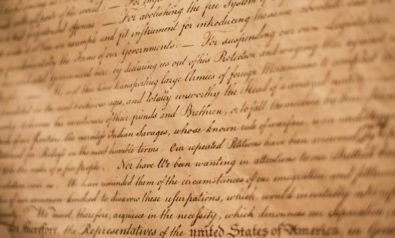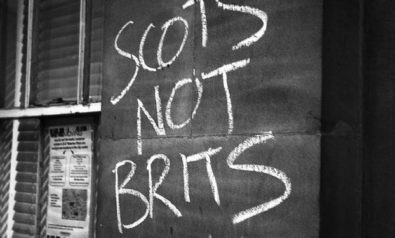What part does national identity play in Scotland’s bid for independence?
In a remarkable confluence of political events, independence for national territories – what I call understated nations – is on the agenda with a vengeance. With an election in Catalonia, a referendum in Scotland in 2014 following two elections victories for the Scottish National Party in 2007 and 2011, and outwith Europe, the election of a minority nationalist government in Quebec – all seem to presage the possibility of constitutional change and the break-up of existing states. My task is to explain Scotland, and in particular the relationship, if any, between the rise in Scottish national identity, and political-constitutional change.
Scotland, with a population of around 5m, is currently part of the United Kingdom (population, 60m). It was an independent state from the first millennium until the Treaty of Union in 1707 at which point ‘Great Britain’ was formed between England and Scotland. This Union is best seen as a ‘marriage of convenience’ (mariage de raison) in which a unitary British state with a single legislature was created in London (the British parliament) while Scotland retained its separate legal system, its national Presbyterian church, and its civil institutions – notably the education system, and local government.
This arrangement worked as long as Scotland and England more or less voted proportionately for the same political parties. This mattered, especially to the Scots who were outnumbered in the 20th century by the English by ten to one in terms of population. In other words, Scots, as the demographic minority, were always more likely to get a UK government elected by the English. The fracture appeared in the mid-1950s, and the gap between Scottish and English voting behaviour has grown in the last 60 years. The reasons why this happened are complex, but are derived mainly from diverging socio-economic frameworks. The post-war decline in Scottish heavy industry required early state intervention through The Scottish Office, the local and autonomous arm of the state, which began a proactive campaign to attract inward investment, notably in micro-electronics. The discovery of North Sea oil in the late 1960s reinforced this divergence with England, and provided the political opportunity for the Scottish National Party (SNP) to become a major player in Scottish politics. There was always a basic anomaly present: despite having a single legislature, and hence being a unitary state, the UK was also a multi-national state, comprising England, Scotland, Wales, and Northern Ireland (the whole of Ireland until 1921 when the island was partitioned).
Increasingly, the non-English nations got a government at Westminster they did not elect. That persuaded the Labour and Liberal parties to campaign for and, once Labour was elected in 1997, to establish devolved government in these national territories in 1999, with responsibility for domestic affairs. The setting up of a parliament in Scotland (and a national assembly in Wales) was a constitutional response to this anomaly. In Scotland, the election of successive Labour-Liberal coalition governments suggested to many that this was a suitable half-way house; that it was the ‘settled will’ of the Scots.
It became obvious, however, from the outset that, although ‘devolution’ was supported by about 60% of Scots (independence stood at roughly 30%, and the status quo ante – no parliament at all – a mere 10%), most people wanted a more powerful institution, with control over welfare and taxation in particular. As many as two-thirds of Scots now want either independence or a parliament with control over everything apart from defence and foreign affairs, the so-called devolution-max option.
Surely, one might ask, the desire for more self-government in Scotland is fueled by an increase in Scottish national identity? The conventional way of measuring national identity is to get people to place themselves on a 5-point scale ranging from ‘Scottish not British’ through to ‘British not Scottish’, with a mid-point ‘equally Scottish and British’. There are two intermediate points: ‘more Scottish than British’, and ’more British than Scottish’. Going back 20 years, we find that most people – roughly two-thirds – describe themselves as either ‘Scottish not British’ or ‘more Scottish than British’. The time-span is the key: it hasn’t changed much in twenty years, even in the lifetime of the Scottish parliament, but that is because being strongly Scottish was the driver of devolution rather than its effect.
But surely, you might reply, those who said they were Scottish not British (about one-third of Scots) would be strong supporters of Independence? Indeed, one-third of Scots support Independence, so surely they must be the same people? Not exactly. Just over half of those saying they were Scottish, not British, support independence, which means that just under half of them do not. In other words, the correspondence between national identity and constitutional preference is a fairly loose one. There is no simple relationship between people’s sense of their national identity, and their constitutional preference, still less how they translate those into how they vote. Thus, many people who thought of themselves as ‘only Scottish’ would vote Labour, and be in favour of devolution, just as many who voted SNP would settle for devolution, and might even say they were ‘more Scottish than British’.
Having said that, it became clear that electoral success for the SNP in 2007, when they formed a minority government, and in 2011, when they got an overall majority, was the result of two factors. They managed to capture much higher proportions of people than in previous elections who described themselves as ‘only Scottish’, and of supporters of Independence than previously. They were also judged to be able to provide more competent government for Scotland than other parties, notably Labour, its closer challenger.
Does that mean that people’s national identity is irrelevant when it comes to constitutional preference? Not at all. To be sure, there is not much change over time in the association between national identity and preferred constitutional outcome. About half of those who describe themselves as Scottish not British opt for independence, and this has stayed fairly steady for the last fifteen years. It would, however, be a strong overstatement to say that thinking of oneself as ‘only Scottish’ is not a significant factor in being in favour of Independence. Other factors matter. Men are more likely to be in favour, as are young people, those with middling levels of education and of intermediate and lower social class. All things being equal – and this is something which statistical modeling allows us to say – national identity is by far the strongest factor in explaining support for independence, followed by being male (2011 Scottish Social Attitudes survey).
So how does this translate into how people might vote in a referendum on Independence in 2014? On the face of it, if support for Independence stands at about one-third of Scottish public opinion, the case would seem to fall. But recall that a significant majority of Scots want more self-government, a parliament with substantially more powers (and this includes two-thirds of Labour supporters). It is true that the referendum question ‘Do you agree that Scotland should be an independent country?’will require a simple yes/no answer. In the negotiations between Westminster and Holyrood, it was clear that the ‘Unionist’ parties (Labour, Conservative and Liberal Democrats) did not want a multi-option question which included Independence, Devolution-max, the current status quo of a devolved parliament, and no such parliament at all. One might also imagine the possibility of a plural vote so that people could give their 1st and 2nd choices, or indeed rank them all. This was rejected by Unionists as being too risky. They wanted, and got, a straightforward yes/no to independence, even though Scottish public opinion is not so simply structured. Significantly, the Nationalist government seemed not unhappy with a multi-option referendum, for the likely outcome might have been that ‘devolution-max’ might have won the day, with supporters of Independence giving it as their 2nd choice. It also maps more accurately on to people’s constitutional preferences than a simple yes/no to Independence. The challenge for the Nationalists is to persuade voters to take two steps to independence rather than one step at a time; first devolution-max, then full independence.
The key question is: how will those who want a more powerful Scottish parliament choose to vote? Will they express their desire for more self-government by voting for Independence, or will they settle for the Scottish parliament as presently constituted under devolution? In other words, if we assume that one-third of Scots would vote for independence, how would the Scottish government achieve 50%? In the 2011 Scottish Social Attitudes survey, we asked a somewhat different question on constitutional options. If we reformulated the ‘Independence’ option to read ‘the Scottish parliament should make all decisions affecting Scotland’, support jumped to 40%. Trying to interpret how supporters of greater self-government short of Independence would vote in a referendum is difficult. However, if we made an assumption that such people would split 50/50, then a ‘yes’ vote in the 2014 is just about achievable.
If the outcome to the referendum was a ‘no’ vote, what would happen? The Unionist parties have promised to look again at further powers for the Scottish parliament, but they are divided. They know what they are against, but not what they are for. Indeed, after the 2007 Scottish election, they combined to set up the Calman Commission as a way of stymieing the SNP, but it produced very little to speak of and, in any case, any constitutional legitimacy it had was swept away by the outright victory of the Nationalists in 2011. The Scottish electorate is, wary of vague promises by political parties whom they judge less able than the SNP to work in Scotland’s long-term interests.
Regardless of the outcome of the referendum vote, one might say that the cat is out of the bag. Scots want more self-government. How – and when – that is to be achieved is the question. Does this represent something for the rest of the world to worry about? Scottish nationalism is territorial, not ethnic. This is not about releasing demons and fomenting hatred. An eminent historian once said that Scots have a sense of place rather than a sense of tribe. Who ‘we’ are is defined by who lives in Scotland. It is not a matter of people’s blood or origins. We take pride in being a mongrel people. In many ways, the question about our constitutional future has changed subtly and radically. The default question is no longer why Scotland should be Independent, but why not? The issue is how much self-government in an inter-dependent world should Scotland have to suit its interests in the 21st century. Joining with England in the 18th century made sense, but the world was a very different place then. Our mariage de raison has probably run its course. The key question is what kind of ménage we now wish to inhabit.
Picture: Copyright © Shutterstock. All Rights Reserved.
The views expressed in this article are the author’s own and do not necessarily reflect Fair Observer’s editorial policy.
Support Fair Observer
We rely on your support for our independence, diversity and quality.
For more than 10 years, Fair Observer has been free, fair and independent. No billionaire owns us, no advertisers control us. We are a reader-supported nonprofit. Unlike many other publications, we keep our content free for readers regardless of where they live or whether they can afford to pay. We have no paywalls and no ads.
In the post-truth era of fake news, echo chambers and filter bubbles, we publish a plurality of perspectives from around the world. Anyone can publish with us, but everyone goes through a rigorous editorial process. So, you get fact-checked, well-reasoned content instead of noise.
We publish 2,500+ voices from 90+ countries. We also conduct education and training programs
on subjects ranging from digital media and journalism to writing and critical thinking. This
doesn’t come cheap. Servers, editors, trainers and web developers cost
money.
Please consider supporting us on a regular basis as a recurring donor or a
sustaining member.
Will you support FO’s journalism?
We rely on your support for our independence, diversity and quality.













Comment